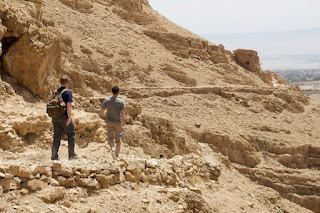And who is my neighbor?
There are two important things happening in today’s gospel lesson. 1
- An exchange between Jesus and a lawyer, who fires off a line of questioning that he hopes will trip Jesus up.
- Is this well known parable, The Good Samaritan, which might be more aptly named, The Good Neighbor.
The lawyer who approaches Jesus would have been an expert in Jewish law, and he was quite deliberate in his questioning.2 He asks:
What must I do to inherit eternal life? (v.25)Now, Jesus is wise, and knows exactly what this lawyer is up to. He playfully uses the law as a teaching moment. Jesus asks:
What is written in the law? What do you read there? (v.26)
The lawyer references two passages:
- In Deuteronomy, the law says we are to love God with all our heart, soul, strength, and mind. (6:5)
- In Leviticus, the law says we are to love our neighbor as ourselves. (19:18)
Jesus affirms that the lawyer has indeed given the right answer, and tells him:
Do this, and you will live. (v.28)
But this lawyer still thought he could make himself look good, so he provokes Jesus with just one more question:
And who is my neighbor? (v.29)
Jesus then shifts into telling us our parable:
There was a man traveling from Jerusalem to Jericho who fell into the hands of robbers. He was stripped, beaten, and left for dead. (v.30)
The road from Jerusalem to Jericho is about 18 miles, with an elevation that drops 3,600 feet. 2/3 It is a dry, barren, and narrow road that was an important route for trading caravans, military personnel, and pilgrims heading to and from Jerusalem. 4 Full of rocky, hiding places; it is an ideal place for robbers to set upon travelers. 4 Up until the fifth century, this road was actually called the red or bloody way, and folks would pay local guides to help ensure their safety. 3 Imagine that kind of scenery, as we dive deeper into this parable.
By chance, a priest was going down that road; when he noticed the man he moved over to the other side. (v.31) Likewise, a Levite was traveling along that road and also noticed this man. He too passed by on the other side. (v.32) But then a Samaritan saw the man, and was moved with compassion. He went to the man, tended his wounds, set him on his animal, brought him to an inn, and took care of him. The next day, he paid for their stay, and asked the innkeeper to continue caring for the man, promising he would return to repay him any costs he encountered. (v.33-35)
The parable invites our curiosity:
Why did the priest and Levite pass to the other side? Some say it was because they both had roles at the temple, and they needed to maintain ritual purity to abide by the law. Yet there are several passages within the Torah which debunk that theory. 6 Meaning, the law, the heart of this entire encounter - was not what stopped them.
For that matter, why did the Samaritan stop to help? Those listening, would have been expecting the hero of the story to be an Israelite. 2 Yet instead, the hero was a man from a distinct ethnic group that lived in tension with the Israelites. 2
So what were the motivations for this priest, Levite, and Samaritan?
The most helpful explanation I have found is in a speech that Martin Luther King, Jr. delivered the night before he was assassinated. Titled, “I’ve Been to the Mountaintop”, this speech was given in support of the striking sanitation workers in Memphis, Tennessee, and in it, he refers to today’s parable. 5
King points out the fear that the priest and the Levite must have felt on this dangerous road, asking themselves,
“If I stop to help this man, what will happen to me?” 5
In other words, what if this was a trick? What if this man was actually just lying in wait, hoping to attack them? Or what if he really did need help, but the robbers that had hurt him were nearby, eager to attack anyone who stopped to help?Their fear limited their perspective, and it kept them focused on self-preservation.
King goes on to say,
But the Samaritan asked, “If I do not stop to help this man, what will happen to
him?” 5
The Samaritan was able to take in the wider perspective, that we are ALL responsible for one another. Within the teachings of the law - again, the heart of this entire encounter - is the truth that everyone must be treated as a neighbor. 2 This definition includes fellow citizens who live nearby, the stranger, or those who might be seen as enemies. 2
Now, what if we were to take King’s reading one step further... 7
What if the Samaritan asked himself,
“If I do not stop to help this man, what will happen to me?”
In other words, what if we acknowledge there is a real cost to our souls, when we choose self-preservation before love of God and neighbor? That there are high stakes for God’s world, when we choose our individual well-being before that of the community? The Samaritan understands what King alludes to in his sermon - that God is calling on us to “...develop a kind of dangerous unselfishness.” 5
When Jesus is finished telling this parable, he asks the lawyer,
Which of these three was a neighbor to the man who was robbed? (v.36)
It is worth pausing to remember that the lawyer’s last question was:
“And who is my neighbor?” (v.29)
But at this point, Jesus is flipping the script by asking,
“Which of these three was a neighbor?” (v.36)
The point being we are ALL neighbors, those who live nearby, strangers, and those we think of as our enemies.
The lawyer answers Jesus’ question,
“The one who showed him mercy.” (v.37).
And the encounter ends, as simply as it began, by Jesus telling the lawyer:
“Go and do likewise.” (v.37)
As we reflect on what it means to be a neighbor, I’d like to push us to take this parable even one step further. What if when we consider what it means to be a neighbor, we ask ourselves what it means to be a neighbor to ALL of creation?What if we read this parable as though the earth herself was the one who had been robbed, stripped, and beaten, before being left for dead on the side of the road? We have allowed corporations to rob the earth of its natural resources and to pollute every corner of creation, in pursuit of their own economic gain; in their mission to fulfill our every want and desire, as long as we are willing to pay.
James “Gus’” Speth once said that, “The main threats to the environment are not biodiversity loss, pollution, and climate change…They are selfishness and greed and pride.” 8
We can choose self-preservation, ignoring the science telling us the climate crisis is real, that we must act now or let our children, grandchildren, and great grandchildren suffer the consequences. Denial allows us to ignore the reality that, “...climate change intensifies every system of injustice, discrimination and disadvantage,” as theologian Jim Antal describes in his book, Climate Church, Climate World. 9. Like the fearful priest and Levite, we can move to the other side of the road, ignoring God’s law that requires us to be a neighbor to one another and creation.
Or we can look to the Samaritan, and ask ourselves:
If I do not stop to help, what will happen to creation?
If I do not stop to help, what will be the cost to my soul?
To our collective wellbeing?
What might it look like for us to be a neighbor to creation? Environmentalist Bill McKibben suggests that the best thing we can do for the climate is to stop being an individual, because, as he notes: “Movements for social change are fueled by bottom-up engagement in which people identify with the movement and claim their collective power.”10 When we work together in unity, we can overcome corrupt systems of oppression that seek to bleed the earth dry of all her resources. We can use our collective power, influence, voice, vote, and wallets to demand change wherever we work, live, play, and do business.
We might also look to our siblings in the United Church of Christ, who in 2017 passed a resolution that called upon its churches and members. Part of the resolution read:
“Let us all incarnate the changes we long for…let us commit to making decisions of integrity in our energy choices, undoing the disproportionate impact of climate change on communities of color, indigenous communities, and poor white communities around the world even as we commit to hold all our religious, political, corporate, and global leaders accountable to do the same.” 11
Dear ones, as we head into the world this week, let us find ways to collectively love ALL our neighbors - one another and the earth herself. Amen
As preached at The Episcopal Church of Saints James and Andrew, Greenfield, MA on July 10, 2022
Photo from: http://faith.nd.edu/s/1210/faith/interior.aspx?sid=1210&gid=609&pgid=33100
1 Luke 10:25-37 New Revised Standard Version. Unless otherwise noted, all passage references are from Luke 10.
2 The Jewish Annotated New Testament, Amy-Jill Levine and Marc Zvi Brettler, editors, 2011, pages in order of reference: 124, 124, 123, 121, 121, 123, 123
3https://www.christiantoday.com/article/the-jericho-road-jesus-parable-is-about-transformation-not-charity/131527.htm
4 http://faith.nd.edu/s/1210/faith/interior.aspx?sid=1210&gid=609&pgid=33100
5 https://www.afscme.org/about/history/mlk/mountaintop
6 Numbers 19:10b-13; Tobit 1:16-20; Leviticus 21 (for more references, see commentary in The Jewish Annotated New Testament, Amy-Jill Levine and Marc Zvi Brettler, editors, 2011, pg. 123.
7 As inspired by listening to Sermon Brainwave: https://podcasts.apple.com/us/podcast/brainwave-852-fifth-sunday-after-pentecost-ordinary/id1538186845?i=1000568536841
8 James ‘Gus’ Speth as quoted in Jim Antal’s Climate Church, Climate World, 2018, pg. 9
9 Jim Antal’s Climate Church, Climate World, 2018, pg. 2.
10 Bill McKibben as quoted in Jim Antal’s Climate Church, Climate World, 2018, pg. 25.
11 I first read this resolution in Jim Antal’s Climate Church, Climate World. You can find the entire text of the resolution here: http://synod.uccpages.org/res21.html
2 The Jewish Annotated New Testament, Amy-Jill Levine and Marc Zvi Brettler, editors, 2011, pages in order of reference: 124, 124, 123, 121, 121, 123, 123
3https://www.christiantoday.com/article/the-jericho-road-jesus-parable-is-about-transformation-not-charity/131527.htm
4 http://faith.nd.edu/s/1210/faith/interior.aspx?sid=1210&gid=609&pgid=33100
5 https://www.afscme.org/about/history/mlk/mountaintop
6 Numbers 19:10b-13; Tobit 1:16-20; Leviticus 21 (for more references, see commentary in The Jewish Annotated New Testament, Amy-Jill Levine and Marc Zvi Brettler, editors, 2011, pg. 123.
7 As inspired by listening to Sermon Brainwave: https://podcasts.apple.com/us/podcast/brainwave-852-fifth-sunday-after-pentecost-ordinary/id1538186845?i=1000568536841
8 James ‘Gus’ Speth as quoted in Jim Antal’s Climate Church, Climate World, 2018, pg. 9
9 Jim Antal’s Climate Church, Climate World, 2018, pg. 2.
10 Bill McKibben as quoted in Jim Antal’s Climate Church, Climate World, 2018, pg. 25.
11 I first read this resolution in Jim Antal’s Climate Church, Climate World. You can find the entire text of the resolution here: http://synod.uccpages.org/res21.html




Comments
Post a Comment